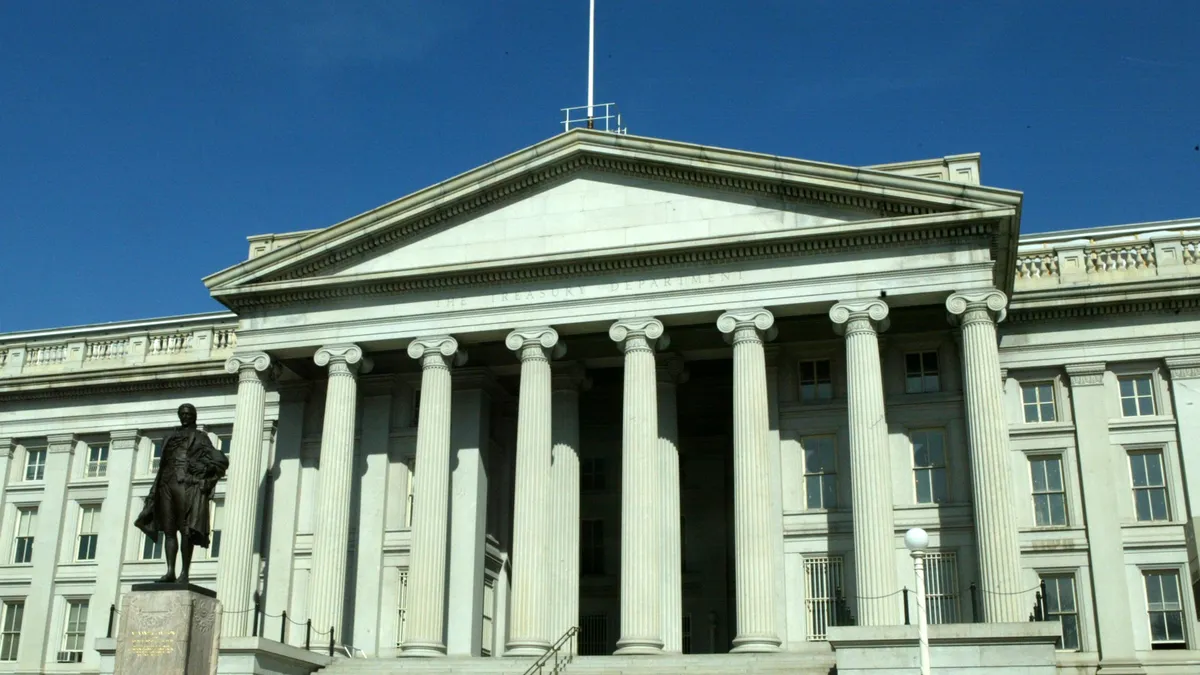Treasury Department’s Financial Crimes Enforcement Network issued an alert Friday urging financial institutions to be vigilant in spotting suspicious Hamas-related activity and reporting it to the agency.
The alert is in response to Hamas’ attack on Israel on Oct. 7, which left more than 1,000 civilians, including U.S. citizens, wounded, killed or taken hostage. The State Department designated Hamas as a foreign terrorist organization in October 1997 — making it eligible for sanctions by the Treasury Department.
FinCEN notes Hamas funds its operations and members through various means, including support from Iran, private donations, global investments, diversion of charitable aid, control of crossings and commerce, criminal racketeering, extortion of local people and fundraising campaigns involving virtual currencies and fake charities raising both fiat and virtual currency.
“Hamas moves funds through the smuggling of physical currency as well as a regional network of complicit money transmitters, exchange houses, and Hizballah-affiliated banks,” FinCEN said.
The agency identified several red flags to help detect and report potential suspicious activity related to financing Hamas, including watching for customers who conduct transactions with entities designated by the Office of Foreign Assets Control or transaction information like addresses, phone numbers or virtual currency details that can be linked to designated groups or individuals.
“As no single red flag is determinative of illicit or suspicious activity, financial institutions should consider the totality of available facts and circumstances, such as a customer’s historical financial activity, whether the transactions are in line with prevailing business practices, and whether the customer exhibits multiple red flags, before determining that a behavior or transaction is suspicious,” the department noted.
FinCEN urged to be vigilant if a customer transaction indicates support for “terrorist campaigns” or if a customer conducts transactions with a financial institution, including virtual currency providers, operating in higher-risk jurisdictions linked to Hamas activity and is reasonably suspected of having weak customer due diligence, opaque ownership, or non-compliance with anti-money laundering best practices.
Financial institutions must also watch out if a customer conducts transactions involving entities that are shell corporations, general “trading companies,” or maintain connections to Iran or other Iran-backed terror groups like Hizballah and Palestinian Islamic Jihad.
Hamas particularly warned of situations when a charitable nonprofit customer solicits donations without apparent charitable services or openly supports Hamas operations, if a nonprofit customer receives large donations from an unknown source and then transfers it to other charities, or if a customer conducts transactions with known or suspected virtual currency addresses associated with terror financing campaigns — all should be closely monitored for Hamas-related activities.
Hamas crypto ties
FinCEN issued a notice of proposed rulemaking Thursday to enhance transparency in convertible virtual currency mixing and to combat financing for malicious activities worldwide. The move followed a letter sent to the Treasury Department and the White House last Tuesday from 105 lawmakers led by Sens. Elizabeth Warren, D-MA; Roger Marshall, R-KS, and Rep. Sean Casten, D-IL, that claimed Hamas was using digital assets to fund their operations. The lawmakers urged the Biden administration to crack down on the use of cryptocurrencies by Hamas and its affiliates.
“Congress and this administration must take strong action to thoroughly address crypto illicit finance risks before it can be used to finance another tragedy,” the letter said, according to Reuters.
On Wednesday, the Biden administration issued sanctions that could disrupt funding for Hamas while singling out people involved in its investment portfolio and a Gaza-based cryptocurrency exchange among its targets, the wire service noted.
Regulators and politicians have warned for long — the use of crypto coins and exchanges to raise and transfer funds for proscribed groups’ activities. The recent attack on Israel has highlighted the importance of prompt action to cut off these channels, the Financial Times reported.
In the week following the attack, Israel closed over 100 accounts on Binance and requested information on nearly 200 additional accounts – most of which were on Binance’s platform. Since the attack, the Israeli authorities identified more than 150 crypto donation activities linked to Hamas and its affiliated groups, FT noted.
“Hamas often relies on small-dollar donations, including through the use of virtual currency” for fundraising, Treasury said this week.
Binance confirmed to the publication that it had “blocked” a “small number” of accounts since the summer and said it adheres to the international sanction rules. But it declined to comment further, according to FT.
This is not the first time Hamas has used cryptocurrencies to its benefit. In May 2021, after clashes between Israel and the militant group, Elliptic, a blockchain analytics company, said Hamas received over $73,000 in bitcoin within a few days. Further, Israel said Hamas-affiliated accounts received more than $7 million in crypto by July that year.
“The international community should find a way to police this threat more effectively because it’s growing,” Yair Samban, director at software firm Pegasystems, told the Financial Times.



















